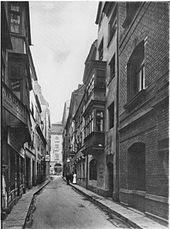Preusser (family)
The Preusser family was an important merchant family in Leipzig , which had been part of the economic and political leadership of the city since the first half of the 15th century. Between 1432 and 1641 a total of eight family members belonged to the Leipzig council.
In the city, the Preussers owned the houses Markt 11 (later Aeckerleins Hof ) and Petersstraße 25 and a trading yard (Preußers Hof) in the southern old town. The latter was demolished in 1552 and a connecting road between Petersstrasse and Neumarkt was created across its site, with tenement houses being built on both sides. It was named Preussergäßchen and still exists today.
The family strove to acquire property outside of the urban area at an early stage. In 1438 Konrad Preußer (Bruser) was enfeoffed with the property of the "Altenburg" in front of the Ranstädter Tor , the fish duty in Leipzig and the church in Seehausen . In 1443 Cunz Preusser acquired Althen . Half of the village of Mockau is also mentioned in 1456 as owned by the Prussians. Between 1524 and 1540, Wolf Preußer built the Thonberg suburb . In the area of today's Egelstrasse in Leipzig, Wolf Preusser had already had the Egelpfuhl lent to himself in 1521, which he used commercially to breed leeches .
The family was also involved in mining in the Ore Mountains. Hans Preusser († May 9, 1549) owned a mine in Schneeberg and, together with Wolf Wiedemann, iron mines in Oberschlema and Neustädtel as well as a hammer mill . Heinrich Preusser, who went from Leipzig to Antwerp , was a tradesman in Marienberg .
In 1673 Johann Heinrich Preusser bought half of the village of Plösen for 1425 guilders. Only 20 years later, when in 1692/93 a debt claim of 6000 thalers could not be settled, all the goods were foreclosed . It is possible that the Prussians, with their strong focus on real estate, lost touch with the early capitalist bourgeoisie, which ultimately led to the decline of their property and their influence.
- Members of the family included
- Hans Preusser († 1457), councilor
- Cunz Preußer († 1500), councilor
- Dr. jur. utr. Johann Preusser, councilor, electoral councilor, chancellor in Saxony († 1507)
- Heinrich Preusser, a factor of the wholesaler Erasmus Schetz in Antwerp around 1525
- Wolf Preusser († 1548), councilor
- Hans Preusser († 1549), councilor (master builder)
- Christoph Preusser († 1555), city judge
- Wolf Heinrich Preußer († 1641), councilor
literature
- Otfried Wagenbreth : The Preußer, a Leipzig patrician family in the 15th to 17th centuries . In: Family and History . 2003, pp. 433-451.
- Horst Riedel: Stadtlexikon Leipzig from A to Z . PRO LEIPZIG, Leipzig 2005, ISBN 3-936508-03-8 , p. 478.
Web links
Individual evidence
- ↑ Codex Diplomaticus Saxoniae Regiae. Document book of the city of Leipzig, Volume 1, p. 145.
- ^ Lexicon of Leipzig street names . P. 60
- ^ Inscriptiones Lipsienses. No. 649.
- ^ Theodor Gustav Werner: Regesta and documents about the holdings of Nuremberg residents in the Rappolt colliery and in other Schneeberg mining and metal trading companies (second section) . In: Communications from the Association for the History of the City of Nuremberg. Vol. 60 (1973), p. 191. ( online )
- ↑ Walter Bogsch: The Marienberger mining since the second half of the 16th century. Berlin 1966, p. 53.
- ^ Werner Emmerich : The rural property of the Leipzig council. Development, management and administration up to the 18th century , H. Haessel -Leipzig 1936. p. 47
- ^ Inscriptiones Lipsienses. No. 655.
- ^ Manfred Unger : The Leipzig Fair and the Netherlands in the 16th and 17th centuries . 18th century In: Hansische Geschichtsblätter 81 (1963), pp. 20–38.
